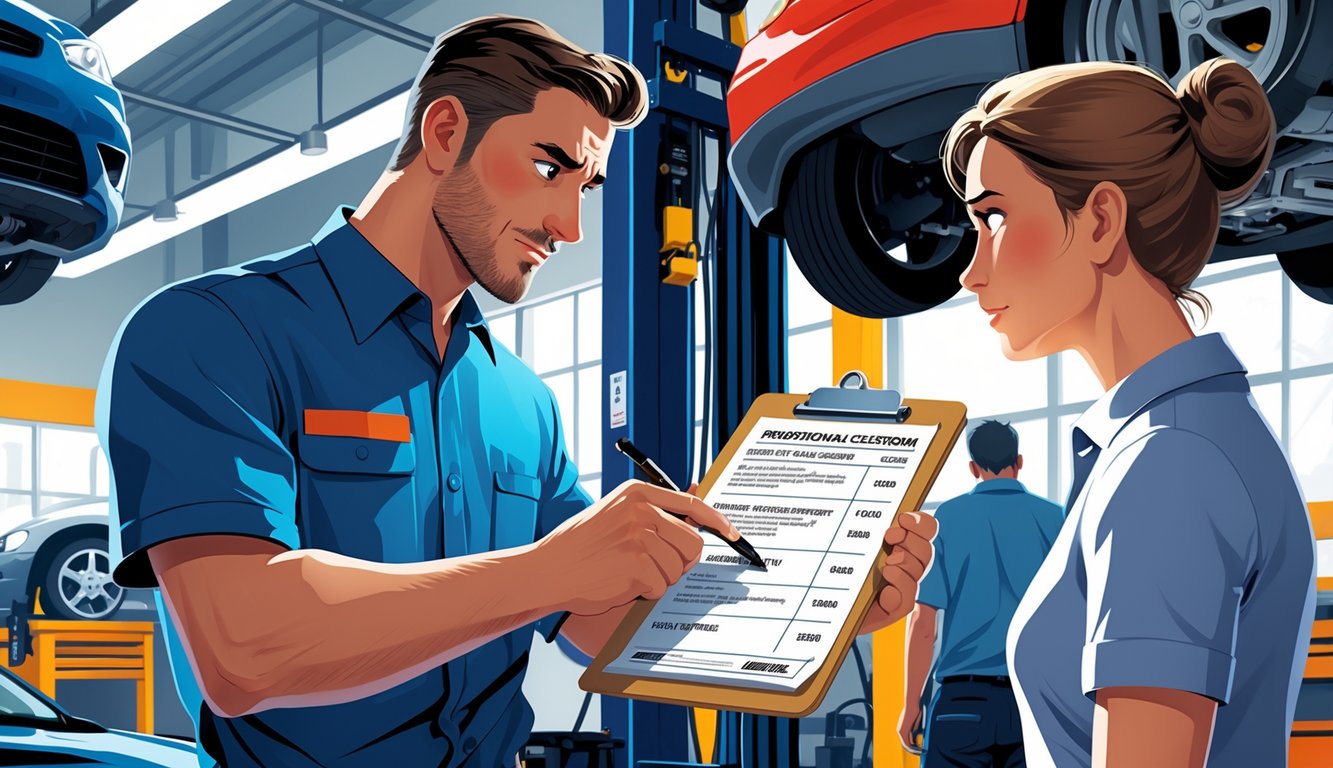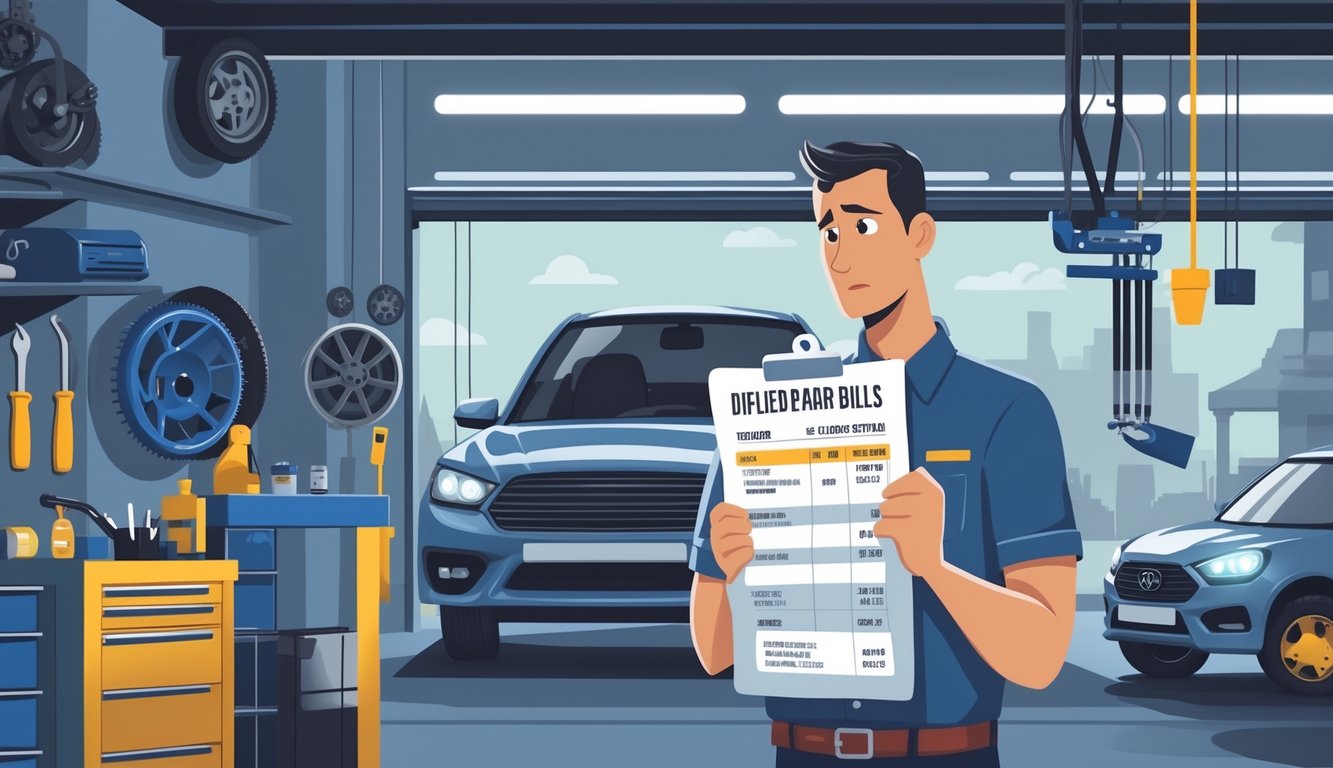
Reviewing and Comparing Quotes
I never agree on the spot. I collect quotes like mismatched socks. One shop wanted $800 for brakes, another gave me popcorn and a way lower price. Popcorn’s not protection. (Still ate it.)
Tables help—way easier to spot the weirdness:
| Service | Shop A | Shop B | Shop C |
|---|---|---|---|
| Brake Pads/Install | $360 | $225 | $400 |
| Cabin Air Filter | $90 | $45 | $80 |
| Diagnostic Fee | $120 | $75 | $100 |
Extras—are they required, or just “recommended”? Usually, it’s the latter, so I just say no and act like I have strong feelings about differential fluid.
Seeking Consumer Protection Support
I called consumer affairs once—felt weird, but hey, they answered. If a shop’s shady or won’t break down charges, I mention the Bureau of Automotive Repair (or whatever it’s called where you live). Sometimes, that changes their tune. Not always, but at least I’m not alone.
Writing a complaint letter is oddly satisfying. After a shop tried to charge me a “miscellaneous disposal” fee—turns out it was just a random line item the guy didn’t even recognize—I started keeping every receipt and those tiny business cards. Consumer groups keep records. Sometimes, just threatening to report gets you a refund. I got fifty bucks back once, probably because paperwork is scarier than me.
Evaluating Shop Transparency and Practices

Shops either rattle off numbers or squint at the computer, poking at the calculator. It’s weirdly exhausting. Why does an air filter cost forty bucks? Is a “shop fee” just for snacks in the lounge? My toes froze last time—drafty counter, no clue why.
Importance of Clear Communication
Ask for an estimate, and you get a cryptic sheet—part codes, labor, “miscellaneous.” Decoding it feels like reading hospital bills. Does anyone actually look at the printout, or is it just awkward until you nod? I want detailed estimates—labor, parts, fees (disposal fees for oil, which, by the way, can cost more than lunch). But half the time, it’s just: “Repairs – $723.” Nope.
Clear, broken-down pricing? That’s what builds trust. If you decline a tire rotation and it still shows up, I get steamed. Most people just want, “Here’s what you need, here’s why, here’s the cost.” Not that hard. Do that, and people actually come back. One shop explained a $48 sensor charge, showed me the part—boom, I’m loyal. But if the spreadsheet fog rolls in, I grab my questions and a notepad. Maybe a snack, too.
Checking Shop Reputation
Supposedly, 64% of people have a shop they actually trust? Feels fake, honestly. Either you’ve got a “car person” or you’re just bouncing around strip malls, hoping for the best. I scroll reviews, sure, but half the time it’s “pizza was great, car fixed”—what? That’s not even the same industry. I’m not eating my brake pads.
Shops that pull surprise bills or push random upsells—yeah, people call that out. Forums, Google stars, whatever, it’s out there. I try to spot the honest ones: like, does anyone mention the staff actually listening, or if the estimate matches the bill? If the waiting room reeks of burnt coffee, well, not a dealbreaker, but it says something, right? Watching how a place handles screw-ups tells you a lot. If they fix mistakes without making it weird, I go back. Even if they once overcharged me for a spark plug, I’ll forgive it. But that time my friend got billed for a transmission flush she never asked for? Nope. I keep a mental list: Was the estimate clear? Did people walk out happy? Did the tech explain stuff, or just grunt and wander off? Reputation’s just this pile of little moments. Sometimes you trust it, sometimes you run.
Building a Strong Customer-Shop Relationship
I’m supposed to be figuring out if I trust a shop, but then I get distracted by the sad little coffee pot by the register. Personalized service, honestly, matters more than a punch card or those coupon flyers taped everywhere. Half the time, I forget why I even needed an oil change. Fairness should be normal, not some lottery win, but here we are.
Value of Personalization
When the tech remembers my name, it’s not dentist-level awkward, just… normal. They ask about that weird rattle, maybe even jot down a note about my last visit—brake pads, or the random pine-scented air freshener they stuck in. I don’t need a balloon or a branded keychain. Just want to feel like a real person, not a VIN number.
I get sucked into their seasonal flyers sometimes. Last fall, “pumpkin spice tune-up”—which, okay, turned out to be a tire rotation plus cinnamon air freshener. Not sure that builds trust, but remembering my car’s quirks? That’s what keeps me coming back. “Customer engagement” isn’t another app or loyalty scheme; it’s the tech joking about my ancient wipers or warning me before they add a charge.
Rewarding Honest Businesses
I’d pay a buck more if it means no one’s sneaking in mystery fees for “engine flushes” I never asked for. Trust shows up in these tiny moments: skipping unnecessary upsells, mentioning a cheaper fix, just being straight. Not a big loyalty program, just this unspoken deal—I’ll keep coming back and send my neighbor (she loses hubcaps constantly) if you don’t mess with me.
I left a review once because the manager explained every line on the bill. Never thought I’d do that. My loyalty’s basically fueled by not having to argue or decode weird charges. I keep recommending the same shop, and honestly, I still can’t figure out how their bathroom smells like lemons and old tires at the same time.
| Action | Why I Care |
|---|---|
| Skipping upsell | Less stress, more trust |
| Detailed invoices | No guessing, no drama |
| Fair recommendations | Loyalty, not resentment |
